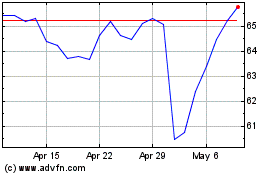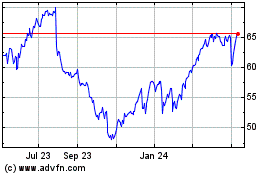New Inversion Rules Test Pending Deals
April 05 2016 - 1:58PM
Dow Jones News
By Liz Hoffman
Treasury's latest shot at stopping corporate inversions could
present a real problem for Pfizer Inc.'s pending $150 billion
takeover of Allergan PLC -- the largest such deal ever -- but will
likely have less of an impact on similar transactions that have yet
to close, like Tyco International PLC's tie-up with Johnson
Controls Inc.
Inversions are deals that became popular in recent years in
which a U.S. company buys a foreign rival and adopts its lower-tax
jurisdiction. Such companies frequently proceed to make more
acquisitions of U.S. companies to bring them on to their lower-tax
platforms.
Inversions have met stiff resistance in Washington, though the
government had been unable to do much to stop them. That may have
changed with the publication late Monday of a third installment of
proposed rule changes, the stringency of which came as a surprise
to many.
In an effort to crack down on what Treasury calls "serial
inverters" -- companies that have done other tax-lowering deals
after inverting -- the regulations unveiled Monday included a
three-year look-back. That means Treasury will disregard three
years' worth of U.S. acquisitions when determining a foreign
company's true size under the tax code.
That complicates the finely tuned math that is crucial for
inversions to work. To reap maximum benefits, shareholders of the
inverting company should own between 50% and 60% of the combined
entity. Between 60% and 80% also works, but the tax perks are
diminished, and above 80%, they are lost entirely. So U.S.
companies need an inversion partner that is at least one-quarter
their size, and ideally more like two-thirds.
When the Allergan deal was struck last year, Pfizer's market
capitalization was about $200 billion and Allergan's was about $123
billion. Pfizer's shareholders would own 56% of the combined
company.
But if you strip out three years' worth of deals done by
Allergan -- which Treasury most certainly would consider a serial
inverter -- that math no longer works. Allergan has 395 million
shares outstanding. It has issued about 260 million shares for big
deals including the $25 billion takeover of Forest Laboratories and
the $66 billion combination of Actavis and Allergan last year.
Stripping those out leaves about 130 million shares, worth only
about $31 billion. Under the current merger ratio, Allergan
shareholders' stake in the combined company would likely drop into
the high teens. In other words, in the eyes of Treasury, Allergan
is likely too small to be Pfizer's inversion partner.
The two companies said Monday that they are reviewing the
regulation and haven't yet commented further.
The move by Treasury has spooked Allergan shareholders who worry
it will make the deal uneconomical for Pfizer and cause the drug
giant to walk away. Allergan shares are down 16%, erasing more than
$16 billion of the company's market value, in a stark signal that
many investors are leaving the deal for dead.
Investors in other companies pursuing inversions took a more
sanguine approach, perhaps because the three-year rule is unlikely
to trip them up. Tyco, the target of Johnson Controls' pending
inversion, has made few acquisitions in the past three years. The
same goes for Canada's Progressive Waste Solutions Ltd., which is
Waste Connections Inc.'s ticket out of the U.S. tax net.
Shares in those companies are falling today, though less
dramatically than Allergan's. Progressive Waste is down 6.5%, and
Waste Connections has fallen 5.6%. Meanwhile, Tyco has dropped
about 2.7%, and Johnson Controls has declined 2.2%. IHS Inc. and
its planned inversion partner, Markit Ltd., are each off about
3%.
Waste Connections and Progressive Waste said in a statement
Tuesday that they are committed to their deal. They expect the
regulations to affect less than 3% of the combined company's
expected first-year adjusted free cash flow of $625 million.
A spokesman for Johnson Controls said the companies were
reviewing the regulations.
Those deals aren't entirely immune from the new regulations.
Treasury also is attacking a practice known as earnings stripping,
which is when inverted companies lend money to their American
subsidiaries and use the interest payments, which are tax
deductible, to lower their U.S. taxes. Treasury will stop treating
those loans as debt, negating their benefits.
To the extent Johnson Controls or Waste Connections hinged their
deals on earnings stripping, they could see their allure
diminished. If the math no longer works -- for example, if the
lessened savings can't support the new company's debt -- some
transactions could be recut or abandoned.
Write to Liz Hoffman at liz.hoffman@wsj.com
(END) Dow Jones Newswires
April 05, 2016 13:43 ET (17:43 GMT)
Copyright (c) 2016 Dow Jones & Company, Inc.
Johnson Controls (NYSE:JCI)
Historical Stock Chart
From Mar 2024 to Apr 2024

Johnson Controls (NYSE:JCI)
Historical Stock Chart
From Apr 2023 to Apr 2024
